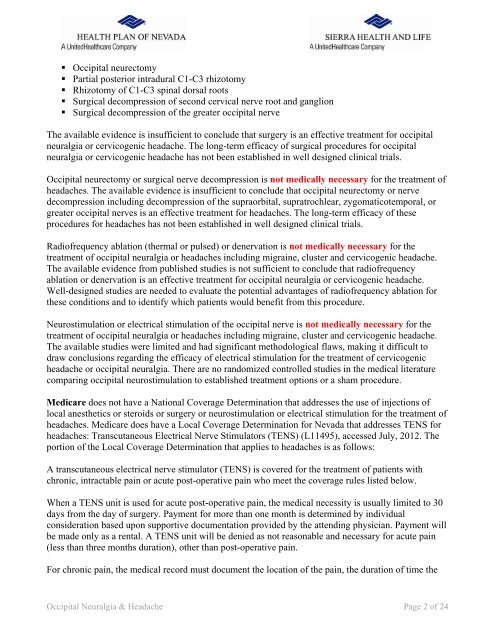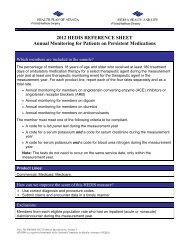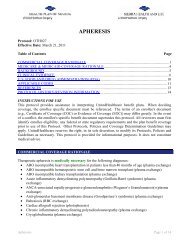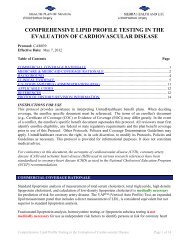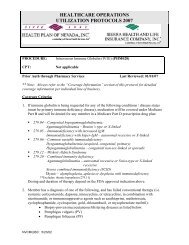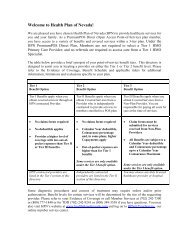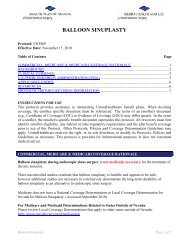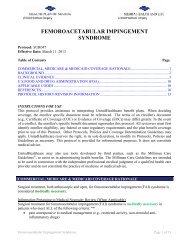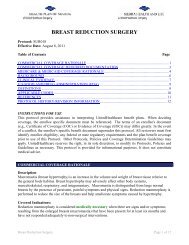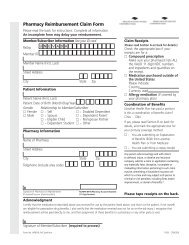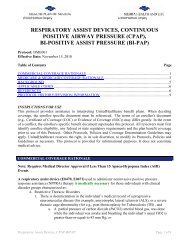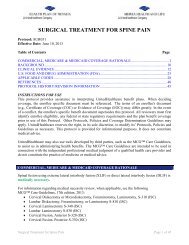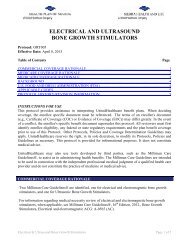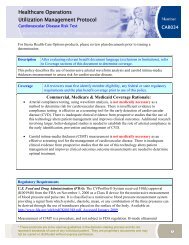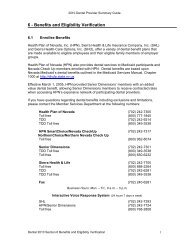occipital neuralgia and cervicogenic, cluster and migraine headaches
occipital neuralgia and cervicogenic, cluster and migraine headaches
occipital neuralgia and cervicogenic, cluster and migraine headaches
Create successful ePaper yourself
Turn your PDF publications into a flip-book with our unique Google optimized e-Paper software.
• Occipital neurectomy<br />
• Partial posterior intradural C1-C3 rhizotomy<br />
• Rhizotomy of C1-C3 spinal dorsal roots<br />
• Surgical decompression of second cervical nerve root <strong>and</strong> ganglion<br />
• Surgical decompression of the greater <strong>occipital</strong> nerve<br />
The available evidence is insufficient to conclude that surgery is an effective treatment for <strong>occipital</strong><br />
<strong>neuralgia</strong> or <strong>cervicogenic</strong> headache. The long-term efficacy of surgical procedures for <strong>occipital</strong><br />
<strong>neuralgia</strong> or <strong>cervicogenic</strong> headache has not been established in well designed clinical trials.<br />
Occipital neurectomy or surgical nerve decompression is not medically necessary for the treatment of<br />
<strong>headaches</strong>. The available evidence is insufficient to conclude that <strong>occipital</strong> neurectomy or nerve<br />
decompression including decompression of the supraorbital, supratrochlear, zygomaticotemporal, or<br />
greater <strong>occipital</strong> nerves is an effective treatment for <strong>headaches</strong>. The long-term efficacy of these<br />
procedures for <strong>headaches</strong> has not been established in well designed clinical trials.<br />
Radiofrequency ablation (thermal or pulsed) or denervation is not medically necessary for the<br />
treatment of <strong>occipital</strong> <strong>neuralgia</strong> or <strong>headaches</strong> including <strong>migraine</strong>, <strong>cluster</strong> <strong>and</strong> <strong>cervicogenic</strong> headache.<br />
The available evidence from published studies is not sufficient to conclude that radiofrequency<br />
ablation or denervation is an effective treatment for <strong>occipital</strong> <strong>neuralgia</strong> or <strong>cervicogenic</strong> headache.<br />
Well-designed studies are needed to evaluate the potential advantages of radiofrequency ablation for<br />
these conditions <strong>and</strong> to identify which patients would benefit from this procedure.<br />
Neurostimulation or electrical stimulation of the <strong>occipital</strong> nerve is not medically necessary for the<br />
treatment of <strong>occipital</strong> <strong>neuralgia</strong> or <strong>headaches</strong> including <strong>migraine</strong>, <strong>cluster</strong> <strong>and</strong> <strong>cervicogenic</strong> headache.<br />
The available studies were limited <strong>and</strong> had significant methodological flaws, making it difficult to<br />
draw conclusions regarding the efficacy of electrical stimulation for the treatment of <strong>cervicogenic</strong><br />
headache or <strong>occipital</strong> <strong>neuralgia</strong>. There are no r<strong>and</strong>omized controlled studies in the medical literature<br />
comparing <strong>occipital</strong> neurostimulation to established treatment options or a sham procedure.<br />
Medicare does not have a National Coverage Determination that addresses the use of injections of<br />
local anesthetics or steroids or surgery or neurostimulation or electrical stimulation for the treatment of<br />
<strong>headaches</strong>. Medicare does have a Local Coverage Determination for Nevada that addresses TENS for<br />
<strong>headaches</strong>: Transcutaneous Electrical Nerve Stimulators (TENS) (L11495), accessed July, 2012. The<br />
portion of the Local Coverage Determination that applies to <strong>headaches</strong> is as follows:<br />
A transcutaneous electrical nerve stimulator (TENS) is covered for the treatment of patients with<br />
chronic, intractable pain or acute post-operative pain who meet the coverage rules listed below.<br />
When a TENS unit is used for acute post-operative pain, the medical necessity is usually limited to 30<br />
days from the day of surgery. Payment for more than one month is determined by individual<br />
consideration based upon supportive documentation provided by the attending physician. Payment will<br />
be made only as a rental. A TENS unit will be denied as not reasonable <strong>and</strong> necessary for acute pain<br />
(less than three months duration), other than post-operative pain.<br />
For chronic pain, the medical record must document the location of the pain, the duration of time the<br />
Occipital Neuralgia & Headache Page 2 of 24


